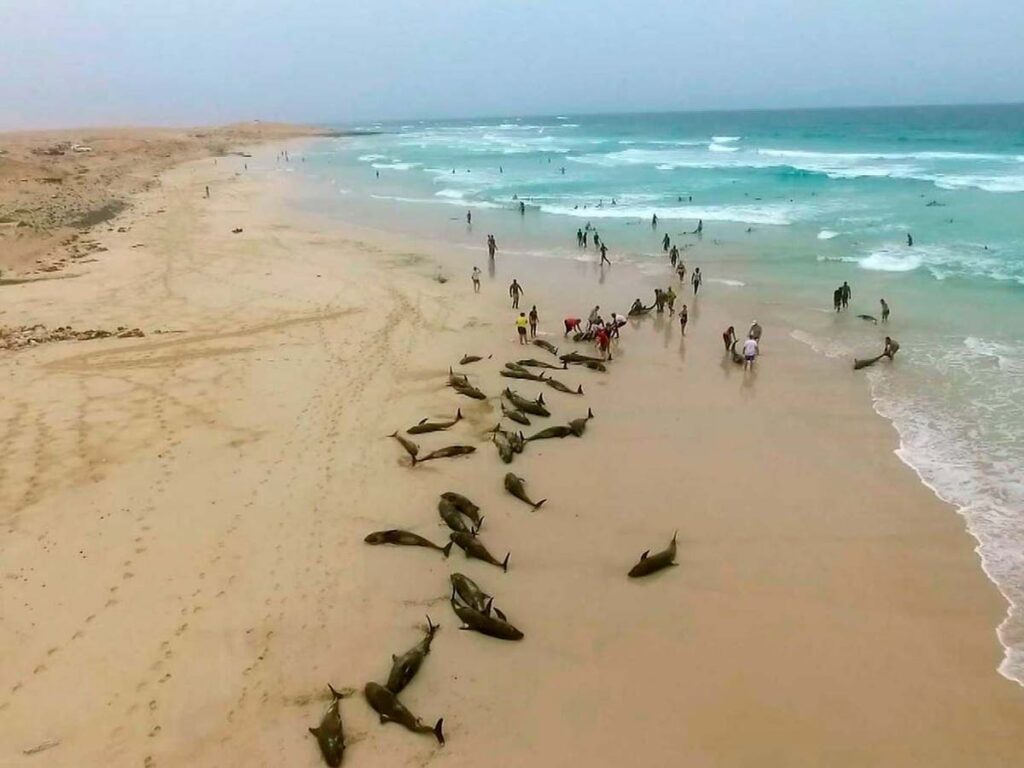Sign up to the Independent Climate email for the latest advice on saving the planetGet our free Climate email
More than 130 dolphins have died after a mysterious mass stranding on a west African beach.
About 200 melon-headed whales – mid-sized dolphins – were found on a beach at the Cape Verde Islands.
Officials, residents and tourists managed to drag some of the animals back out to sea, but many returned.
Bulldozers buried 136 dead dolphins, local media reported.
Shortly afterwards, off the US east coast, about 26 pilot whales beached themselves on an island off Georgia, leaving 15 dead. It was the species’ second mass stranding along the state’s coast since July.
Tragic photos show beached whalesShow all 151/15Tragic photos show beached whalesTragic photos show beached whales
A dead sperm whale lies on Hunstanton beach in Norfolk on 5 February 2016
AFP/Getty
Tragic photos show beached whales
Volunteers pour buckets of water over the 80 remaining live pilot whales found stranded on remote Ocean Beach on New Zealand’s southern-most Stewart island, 8 January 2003
AFP/Getty
Tragic photos show beached whales
Contractors clear away the body of one of the dead 48ft sperm whales that were washed-up on a beach near Gibraltar Point in Skegness, Lincolnshire in 2016
PA
Tragic photos show beached whales
People pass by a beached whale at the Pointe de la Torche, near Brest in France on 29 November 2011
AFP/Getty
Tragic photos show beached whales
A woman touches the tail of a large whale carcass on Wattamola Beach at the Royal National Park in Sydney on 25 September 2018
AFP/Getty
Tragic photos show beached whales
Beached humpback whale in California, 2015
AFP/Getty
Tragic photos show beached whales
Dead long fin pilot whales at Hamelin Bay on Australia’s west coast on 23 March 2009
AFP/Getty
Tragic photos show beached whales
A 36ft sperm whale lies dead on the beach at Sutton Bridge, in The Wash, off the Lincolnshire coast, where it became stranded in 2004
PA
Tragic photos show beached whales
A female fin whale opens its mouth as it lies stranded and alive on the beach at Carlyon Bay, Cornwall on 13 August 2012
Getty
Tragic photos show beached whales
The lower jaw of a dead sperm whale that stranded itself on a beach in Hunstanton, Norfolk on 5 February 2016
Getty
Tragic photos show beached whales
One of the five sperm whales that were found washed ashore on beaches near Skegness, Lincolnshire over the weekend on 25 January 2016
Getty
Tragic photos show beached whales
Employees at work to skin the remains of a beached 60ft whale on 25 January 2013
AFP/Getty
Tragic photos show beached whales
Two long-finned pilot whales are stranded on a beach in the northern French city of Calais on 2 November 2015
AFP/Getty
Tragic photos show beached whales
A sperm whale lies dead after becoming stranded on a beach in Hunstanton, Norfolk on 5 February 2016
Getty
Tragic photos show beached whales
Crowds gather as a sperm whale lies dead after becoming stranded on a beach in Hunstanton, Norfolk on 5 February 2016
Getty
Vets from Spain are preparing to travel to Boa Vista Island off west Africa to carry out tests to investigate why the animals died.
A volunteer environmental group in the former Portuguese colony said it took samples from 50 dolphins, and that the local council placed four others in a deep freeze.
Experts say factors that could contribute to mass strandings include sickness, navigational error, a rapidly falling tide, being chased by a predator and extreme weather.
In the first three months of the year, more than 1,100 mutilated dolphins washed up in south-western France. Experts said most of the deaths were caused by the animals being captured by industrial-sized fishing nets.
Last year around 150 short-finned pilot whales stranded themselves on Australia’s western coast south of Perth.
Support free-thinking journalism and attend Independent events
If marine mammals land on solid surfaces, their chest walls start to compress their internal organs because they are no longer supported by the weight of the water.
Source link : https://www.independent.co.uk/climate-change/news/dolphins-whales-die-strand-beach-west-africa-cape-verde-a9123661.html
Author :
Publish date : 2019-09-27 03:00:00
Copyright for syndicated content belongs to the linked Source.
